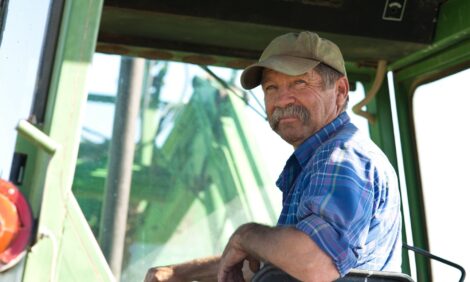



Farm Credit Available... with Strings Attached
US - A global economic slowdown isn't likely to hit agriculture as hard as other industry sectors, but that doesn't mean farmers and their lenders won't see changes ahead, said Michael Boehlje, a Purdue University agricultural economist.While Boehlje said he believes credit will be available for crop and livestock producers, farmers and ranchers might have to jump through more hoops to borrow money. Banks, on the other hand, could require more information and documentation from borrowers.
"At a minimum, producers are going to have to do a better job of showing their lender what kind of profitability they've had and what kind of income they're generating," Boehlje said. "Secondly, it's quite possible that the lender is going to be asking for more detail on the inventory side of a producer's balance sheet. They might ask, 'Have you got some of your products priced with futures or forward pricing contracts for next year? Have you got some of your production costs locked in for next year, and how much?'
* "We're probably going to see capital expenditure loans are a little more difficult to obtain this next year" |
|
Michael Boehlje, a Purdue University agricultural economist.
|
"Producers might end up with more projection work. Whether they'll have to do a full-blown cash flow projection isn't certain. But they certainly are going to at least have to give some additional evidence than they've given in the past of the cash that's going to be generated by their operation next year."
Lenders also could increase their oversight of borrowers, Boehlje said. That might come in the form of more frequent farm visits and monitoring of checking and deposit account balances and spending.
Producers could discover lenders aren't willing to loan them as much money as they ask for, especially if the loan is for purchasing machinery or land.
"We're probably going to see capital expenditure loans are a little more difficult to obtain this next year than they might have been otherwise," Boehlje said. "I suspect lenders are going to be asking more questions about land purchases. Particularly, what kinds of financing will be needed to buy land.
"My sense is we already have seen some indication that lenders are being more conservative in their financing of land purchases. They are worried about the land prices. They might not be willing to finance 80 percent of the land purchase. They may only want to finance 50 or 60 percent of the land purchase. So if a producer wants to make that purchase, they're probably going to have to come up with more cash out of their own pocket."
Other farm credit issues the agricultural industry could face in the months to come include:
- Less aggressive lending. "When there's a lot of uncertainty and increased risk in the markets, lenders turn conservative and are less likely to take on new customers," Boehlje said. "It's probably wise to stick with your current lender and not shop around for a better interest rate."
- Increased restrictions or covenants at loan signing. Lenders might, for instance, require borrowers to have crop insurance or insist on prior approval for capital purchases, Boehlje said.
- Modestly higher interest rates. "Since we don't see the same kind of risk in the agricultural sector that we see in other industries, we don't expect to see dramatic rises in interest rates to reflect those increased risk premiums," Boehlje said.
Producers could be in for one unexpected shock: higher taxes.
"A lot of farmers report their income on a Schedule F tax return, and they are able to use the rules of the Schedule F to lower their tax burden by delaying sales and prepaying expenses," Boehlje said. "What that does is pull their taxable income down. This year, particularly for those who have cash flow problems and find themselves needing to liquidate some assets or sell some of their inventory, that could mean an increase in their taxable income. It's a technical issue, but the tax basis for all raised grain and livestock is zero, so every dollar of sale of that inventory is ordinary taxable income."
Agriculture remains a strong industry and credit risk, Boehlje said. Producers who practice sound money management and accounting should weather the economic storm, he said.
TheCattleSite News Desk


